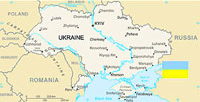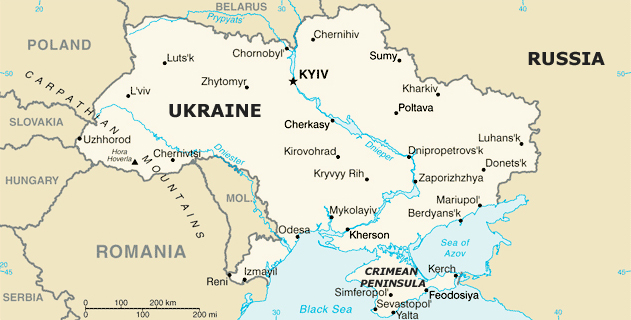Ukraine Wants New IMF Bailout as War Squeezes Economy

(Voice of America – Henry Ridgwell – October 7, 2014) As the annual meeting of the International Monetary Fund and the World Bank gets underway in Washington, Ukraine wants to adjust the terms of its $17 billion bailout. Kyiv says the country is now at war and needs to build new armed forces. But some analysts say the terms of the loans could backfire on Ukraine’s economy.
Despite the supposed cease-fire in eastern Ukraine, Russian-backed rebels are continuing their assaults on government positions around Donetsk airport.
Analysts say the ongoing conflict threatens to tip the country close to bankruptcy.
Economist Oleh Soskin, director of the Institute of Society Transformation in Kyiv, says the World Bank estimate that Ukraine’s economy will shrink by eight percent is generous.
“We’re expecting that [the] Ukrainian GDP will fall by about 15 percent at year-end 2014,” he said. “You have to remember that two parts of the country are cut off – Crimea and Sevastopol – and life in other two large regions, Donetsk and Luhansk, is completely chaotic.”
Everything has stopped
Before the conflict in the east, exports from the Donetsk region totaled $1.5 billion a month, says Donetsk region governor Serhiy Taruta.
He says that today, the companies in the occupied areas are almost all not working, everything has been stopped – coal mines, metal factories, coke plants, machine engineering.
“And, as a result, the export of our products has fallen by 50 percent,” said Taruta.
Ukraine signed a bailout deal with the IMF in April worth $17 billion – part of a broader $27 billion rescue package. Last month, Prime Minister Arseniy Yatsenyuk said it will need boosting because Ukraine is now at war.
But the country should be wary of borrowing more money from the IMF, says Soskin.
“The IMF is always thinking about how they will get their money back with interest,” he said. “So naturally they are laying down corresponding conditions and asking Ukraine: ‘How are you going to repay these loans?'”
Soskin is critical of those conditions – which require spending cuts and an end to gas subsidies. Public sector wages are being cut and property taxes raised.
But such reforms go hand-in-hand with Ukraine’s transformation, insists Donetsk governor Taruta.
He says that reforms will only make Ukraine stronger against the disaster the country now faces. This, according to Taruta, is a time when society is consolidating around one desire – to change the authorities, to conduct reforms and re-start the economy fast.
Ukraine’s National Bank has implemented a floating exchange rate for the hryvnia currency. Its value has plunged by over 40 percent. That makes Ukraine’s exports cheaper – but it has to find new markets.
But weaning Ukraine off its historic reliance on Russia is healthy, says Soskin.
He says that Ukrainian exports to the European Union, Asia, Africa and other parts of the world are growing fast. And so the economy is producing good turnover in this way. Plus, Ukraine is greatly decreasing its dependence on importing oil and gas from Russia, adds Soskin.
As winter fast approaches, analysts say Ukraine’s standoff with Russia over a $5 billion gas bill threatens the ability of its citizens to heat their homes. European officials say they hope to strike an interim deal between the two sides later this month.

